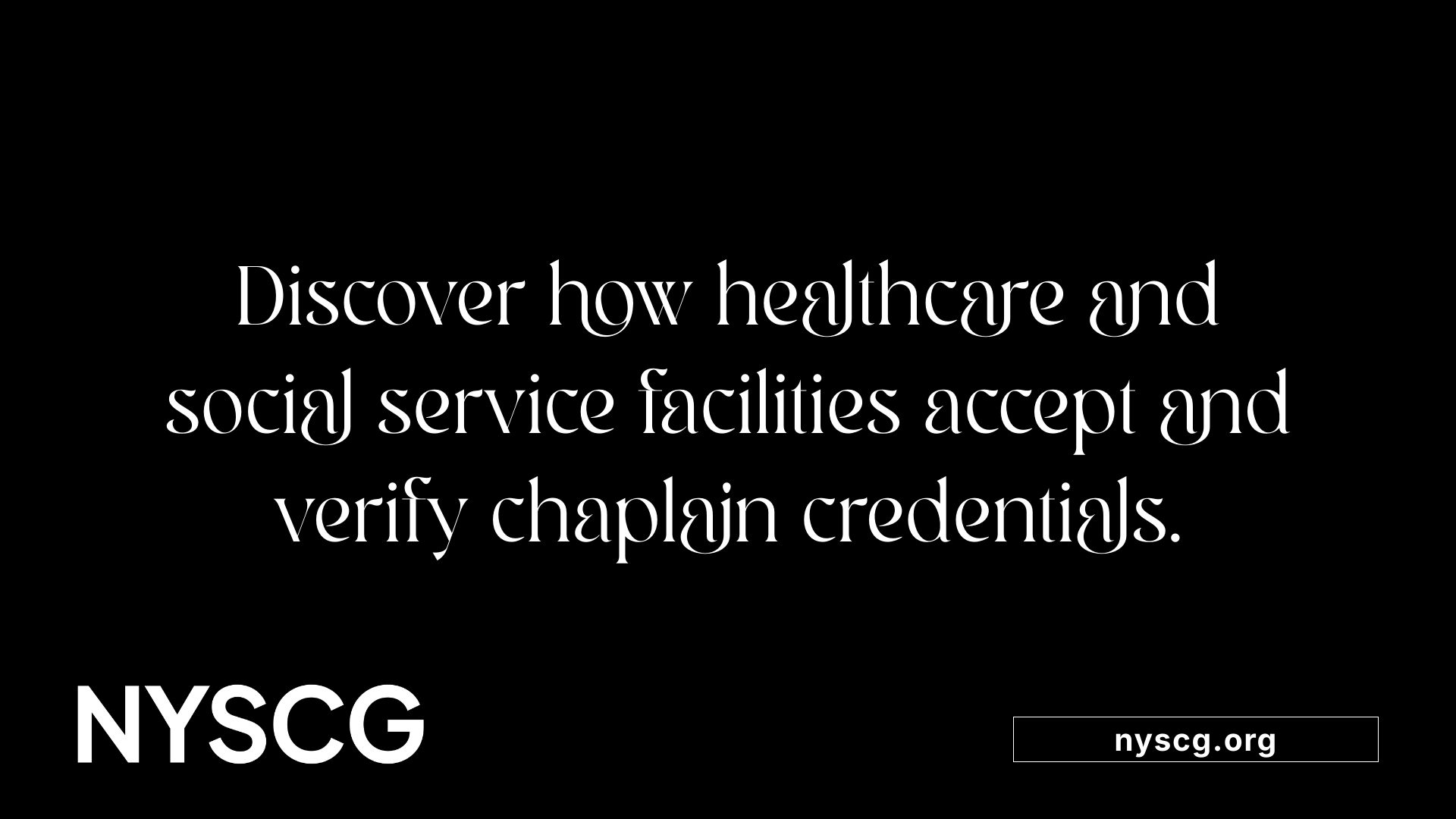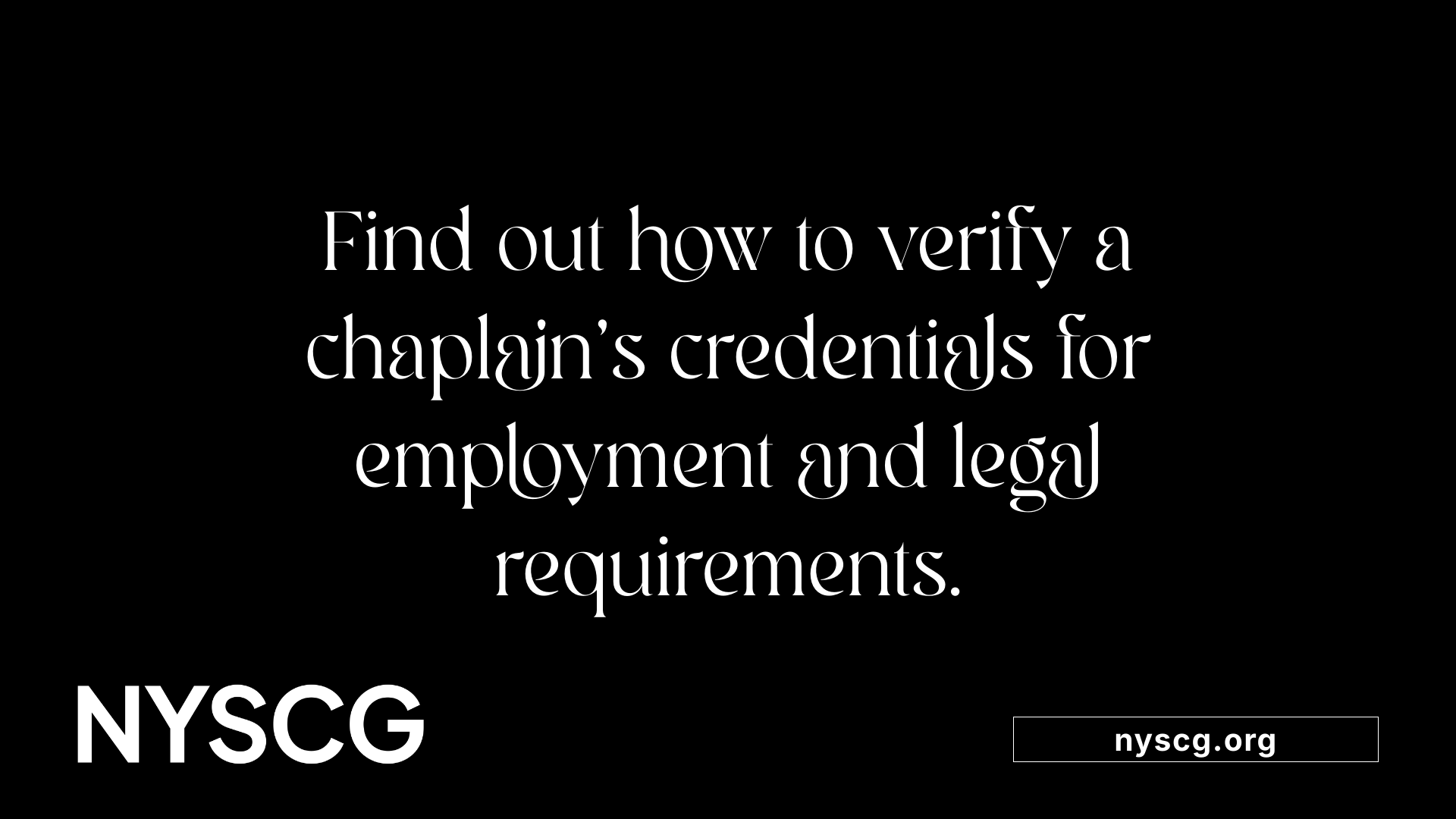Where Chaplain Credentials Are Accepted for Employment


Chaplaincy is a vital component of spiritual and pastoral care across a variety of institutions. Recognized credentials serve as a testament to a chaplain’s qualification and readiness to provide professional support. This article explores where chaplain credentials are accepted, the standards required for various roles, and how certification influences employment opportunities in sectors such as healthcare, military, and veteran services.

To work professionally as a chaplain, individuals typically need credentials that are acknowledged by reputable certifying bodies. The most common certifications include the Certified Chaplain (CC), Board Certified Chaplain (BCC), and Associate Certified Chaplain (ACC). These credentials are awarded by organizations like the Association of Professional Chaplains (APC) and the Board of Chaplaincy Certification, Inc. (BCCI).
Applicants must meet rigorous standards, including possessing degrees from accredited institutions, completing clinical pastoral education (CPE) units, gaining practical work experience, and demonstrating professional competence. These standards ensure chaplains are well-prepared to offer spiritual and emotional support in various settings such as hospitals, military facilities, and community organizations.
The certification process involves assessments by a dedicated committee, which scrutinizes the candidate’s educational background, clinical skills, and ethical conduct. Candidates often need to submit recommendation letters, pass background checks, and sometimes participate in standardized testing or simulated patient scenarios.
Certification is also contingent upon adherence to a strict code of ethics and religious competence, validating a chaplain’s ability to serve diverse populations.
These recognized credentials serve as proof of a chaplain’s training and professional readiness, opening doors for employment opportunities across healthcare, military, and spiritual care environments.
| Credential Type | Recognized Organization | Main Requirements | Typical Settings |
|---|---|---|---|
| CC (Certified Chaplain) | APC, BCCI | Accredited degree, CPE, work experience | Hospitals, community services |
| BCC (Board Certified Chaplain) | BCCI | Advanced education, extensive clinical hours, competence assessment | Hospitals, military, corporate |
| ACC (Associate Certified Chaplain) | BCCI | Basic education, some clinical hours | Healthcare, correctional facilities |
For those interested in the certification process or exploring standards further, searching for "Chaplain certification standards and recognized credentials" can provide comprehensive information.
 Many healthcare and institutional facilities recognize chaplain credentials, especially those obtained from reputable organizations like the Board of Chaplaincy Certification, Inc. (BCCI), the Association of Professional Chaplains (APC), and others. Hospitals, hospice centers, correctional institutions, children’s hospitals, and nursing homes often accept these credentials because they meet strict educational and ethical standards.
Many healthcare and institutional facilities recognize chaplain credentials, especially those obtained from reputable organizations like the Board of Chaplaincy Certification, Inc. (BCCI), the Association of Professional Chaplains (APC), and others. Hospitals, hospice centers, correctional institutions, children’s hospitals, and nursing homes often accept these credentials because they meet strict educational and ethical standards.
For example, hospital chaplains usually need certification from nationally recognized groups, demonstrating they have completed necessary education, clinical pastoral training, and uphold high professional standards. This recognition ensures chaplains are qualified to provide spiritual and emotional support to patients and families in diverse healthcare settings.
In correctional facilities and children’s hospitals, credentials from accredited organizations help maintain quality care standards. Similarly, hospice centers and nursing homes look for chaplains with verified training and certification.
Religious organizations also accept chaplain credentials for ministry and community work, often requiring endorsement from denominational authorities. When it comes to employment within institutions like the VA, specific endorsements and completion of clinical education are mandatory.
However, acceptance of chaplain credentials can differ among organizations. It’s important for chaplains to verify the specific requirements with each facility or organization they seek to serve. Generally, certification from well-known national bodies provides a strong foundation for employment opportunities across various health and social service settings.
| Facility Type | Common Credentialing Bodies | Additional Requirements | Recognition Level |
|---|---|---|---|
| Hospitals | BCCI, APC, NACC | Education, Clinical Pastoral Education (CPE), ethics adherence | Widely accepted in healthcare clinics and hospitals |
| Hospice Centers | BCCI, APC, NAVAC | CPE, religious endorsement, background checks | Recognized for providing end-of-life spiritual care |
| Correctional Institutions | BCCI, APC | Credentials, background check, religious endorsement | Varies; generally recognized within the correctional system |
| Children’s Hospitals & Nursing Homes | BCCI, NACC, APC | Specialized training in pediatric or family chaplaincy, certification | Recognized when credentialed by accredited bodies |
| Religious Organizations | Denominational endorsements, BCCI, APC | Alignment with religious teachings, endorsement, CPE | Usually required for denominational ministry |
Overall, possessing recognized chaplain credentials facilitates professionalism and acceptance across various settings, but individual organization policies should always be checked.

Hospital chaplains must meet specific educational and training standards to ensure they can provide effective spiritual care. Typically, candidates are required to possess at least a bachelor's degree and a master's degree in fields such as divinity, theology, religious studies, or related disciplines. These academic qualifications lay a strong foundation for understanding religious doctrines, pastoral care, and ethical practices.
In addition to academic degrees, clinical pastoral education (CPE) is a crucial component. CPE involves supervised, practical training in providing spiritual care, usually completed through accredited programs like the Association for Clinical Pastoral Education (ACPE). Most certification organizations require around 400 hours of clinical pastoral education, which includes hands-on experience working with patients and their families.
Certification pathways are offered by various professional bodies including the Association of Professional Chaplains, the National Association of Catholic Chaplains, and the National Association of Jewish Chaplains. These organizations set standards for clinical training, educational background, and professional experience.
A significant credentialing requirement is the endorsement from a recognized faith organization or ecclesiastical endorsement. This endorsement affirms the chaplain's good standing within their religious community and their accountability in providing faith-based support.
Candidates must also demonstrate sufficient practical experience through completed clinical hours and work in pastoral settings. Ethical conduct and adherence to a code of ethics are mandatory, with certification subject to revocation if standards are violated.
Many hospitals and healthcare facilities require chaplains to be credentialed or certified by these recognized organizations, ensuring that only qualified individuals provide spiritual care to patients, families, and staff.
| Credentialing Aspects | Requirements | Additional Details |
|---|---|---|
| Educational Degrees | Bachelor's and Master's in relevant fields | Examples include divinity, theology, religious studies |
| Clinical Pastoral Education (CPE) | About 400 hours from accredited providers | Often through ACPE or similar organizations |
| Endorsement | Ecclesiastical or faith-based endorsement | From approved religious bodies |
| Work Experience | Practical experience in pastoral care | Demonstrates ability to work with diverse populations |
| Ethical Standards | Adherence to a professional code of conduct | Ensures accountability and quality of care |
The certification process involves assessments, interviews, and reviews by professional committees. Many certifying bodies require ongoing continuing education to maintain credentials. Certification can be revoked if standards are not upheld, including ethical violations or loss of endorsement. Therefore, these standards ensure that hospital chaplains are well-educated, ethically accountable, and competent in providing compassionate spiritual support.

Military and VA chaplains must meet specific credentialing standards that are recognized and approved by relevant endorsing agencies and professional certifying bodies.
For VA chaplains, the process begins with educational qualifications, typically requiring a Master of Divinity or an equivalent degree from an accredited institution. They must also provide an ecclesiastical endorsement that is current within the past 12 months. Additionally, VA chaplains need to be board certified through the Board of Chaplaincy Certification Inc. (BCCI) or an equivalent organization. This certification involves completing Clinical Pastoral Education (CPE) units, meeting work experience requirements, and passing assessments that demonstrate professional competence.
Military chaplains follow a similar path but also include branch-specific standards. They must be endorsed by their religious organization and undergo specialized pastoral training aligned with their military branch. These training programs cover unique military faith support requirements and are overseen by the Armed Forces Chaplain Board.
Both types of chaplains often pursue additional certifications in areas like grief support or mental health. These are issued by professional organizations such as the Association of Professional Chaplains (APC), the National Association of Catholic Chaplains (NACC), or the National Association of Jewish Chaplains (NAVAC). Such credentials enhance their expertise and provide further recognition within their fields.
Overall, gaining recognition as a military or VA chaplain involves fulfilling educational criteria, securing endorsements from religious authorities, completing designated clinical training, obtaining ongoing professional certification, and adhering to established standards set by military or professional organizations.
 When seeking to confirm a chaplain's professional credentials or employment suitability, it’s crucial to utilize official verification channels. Accredited certification bodies like the Board of Chaplaincy Certification Inc. (BCCI) offer formal services to attest to a chaplain’s certified status. BCCI issues Verification of Certification Letters that are recognized as definitive proof of certification, ensuring the chaplain meets established professional standards.
When seeking to confirm a chaplain's professional credentials or employment suitability, it’s crucial to utilize official verification channels. Accredited certification bodies like the Board of Chaplaincy Certification Inc. (BCCI) offer formal services to attest to a chaplain’s certified status. BCCI issues Verification of Certification Letters that are recognized as definitive proof of certification, ensuring the chaplain meets established professional standards.
Many organizations also maintain online verification tools or offer direct confirmation processes. For instance, the National Association of Catholic Chaplains (NACC) provides verification services for its members, ensuring their credentials are valid and up-to-date.
Employment eligibility depends on meeting specific educational and licensing requirements. For example, VA chaplains must hold a Master of Divinity or equivalent degree, complete clinical pastoral education, and obtain ecclesiastical endorsement within the last year. They must also pass background checks and be U.S. citizens or hold valid exemptions.
To validate a chaplain’s credentials, organizations often require applicants or employers to submit official documentation, such as certification certificates, verification letters, or transcripts. Some credentialing entities, like the APC or NACC, facilitate online verification, enabling employers and institutions to confirm current certification status.
In summary, verifying a chaplain’s credentials involves consulting official certification bodies, using their verification services, and reviewing the necessary documentation. This process ensures that chaplains meet the professional standards required for trustworthy spiritual care roles in healthcare and other settings.
In the diverse landscape of chaplaincy employment, credential recognition plays a critical role across settings including healthcare, military, and spiritual care organizations. Accreditation standards, religious endorsement, clinical training, and professional certification collectively ensure a chaplain's competence and credibility. Meeting these requirements not only facilitates employment opportunities but also affirms a chaplain’s ability to deliver ethically sound and culturally sensitive care. By understanding where and how credentials are accepted, chaplains can strategically navigate their careers, ensuring their qualifications meet the standards of leading organizations and institutions.
All you need is the will to make the world a better place.
New York State chaplain group inc. is a tax deductible organization with a federal tax Id number 92-383-4921